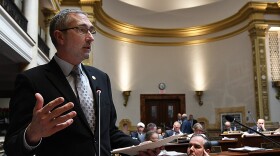Republicans in the state Senate have proposed keeping most of the budget cuts sought by Gov. Matt Bevin, while rejecting House Republicans’ plan toraise about $500 million through taxes on cigarettes and pain pills.
The spending plan quickly passed out of committee Tuesday morning and passed out of the full Senate after a debate Tuesday evening.
The Senate’s version of the budget restores cuts Bevin had proposed for public school transportation funds, but colleges and universities would still see spending reductions.
Sen. Chris McDaniel, chair of the Senate budget committee, said the higher education cuts would go to fund several individual programs across the state’s college and universities.
“We pushed an additional $23 million per year, which roughly works out to the same amount of the 6.25 percent cuts,” McDaniel said. “We’re just modernizing the way we handle higher education funding.”
Bevin’s budget proposed reducing most state spending by 6.25 percent and eliminating 70 programs across state government.
The Senate’s version would restore some of those programs, including the Kentucky Poison Control Center, the Kentucky Mesonet weather monitoring system, funding for colon cancer screening and the Center for Applied Energy Research.
Like Bevin’s budget proposal, the Senate’s version sets aside about $3.3 billion for the state’s ailing pension systems — equal to about 15 percent of state spending for the next two years.
But the Senate budget would put about $1 billion less into the teacher pension fund over two years than Bevin proposed.
Senate President Robert Stivers says elevated funding isn’t necessary for the better-funded Teacher Retirement Systems and the Senate’s budget funds teacher pensions at the amount required by law.
“This is what was put into statute,” Stivers said.
The funds would instead go to the more-poorly-funded pension funds used by state troopers non-hazardous duty state workers.
The Senate budget would block the state from entering into new contracts with private prison companies — though the current contract for Nashville-based CoreCivic to operate a prison in Beattyville would continue to go forward.
Instead, the Senate budget would shift more state prisoners to county jails and also prioritize prison beds for state use before housing federal inmates.
Kentucky officials have warned that the state’s prisons will run out of space by 2019.
Earlier this month, the state House of Representatives voted to generate new revenue by increasing Kentucky’s cigarette tax from 60 cents per pack to $1.10 per pack and creating a 25 cent tax on prescription pain killers.
McDaniel said there wasn’t support for those two measures in the Senate but other revenue-raising measures could be considered before the end of this year’s legislative session.
“I think a lot of the members of the Senate are willing to see a modernized tax code that may end up raising some revenues,” McDaniel said. “We’ll have to see what our House colleagues propose. But certainly I think that there’s a willingness on our side.”
If the state House doesn’t agree with the Senate’s changes — which it is unlikely to — leaders of both chambers will try to hammer out a compromise during closed-door meetings.
Republicans have supermajorities in both chambers of the legislature, giving them enough votes to pass the budget without Democratic support.
The legislature needs to agree on a spending plan by Wednesday, March 28 in order to preserve the right to override any vetoes Gov. Bevin makes to the budget.
This post has been updated.





